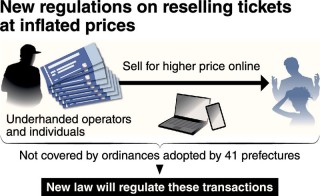Loading
Search
▼ Law to Target Ticket Scalping on Internet
- Category:Event
A new law will crack down on scalpers who sell concert and other tickets at inflated prices online, a move expected to be in place before the 2020 Tokyo Olympics and Paralympics, The Yomiuri Shimbun has learned.
A bill for the new law is being compiled by Liberal Democratic Party lawmakers and will be submitted to the ordinary Diet session set to be convened next month.
The reselling of tickets online has been difficult to strictly control, and the new bill is focused on preventing scalping on the internet.
Its creation has been prompted largely by concerns that reselling tickets at inflated prices could become a problem at the 2020 Games.
The LDP’s federation of lawmakers for promoting live entertainment, which is chaired by Shigeru Ishiba, will submit the Diet member-drafted bill.
According to sources, the law will cover tickets that meet three conditions: They must specify the event’s date, time and venue, and a designated seat; the event organizer must clearly state reselling tickets is prohibited; and the organizer must take steps to prevent scalping, such as checking the identities of ticket buyers.
The fresh law will prohibit the business of acquiring tickets with the intention of reselling them, and transactions in which tickets are sold for more than their face value.
Lawmakers writing the legislation are considering slapping violators with penalties similar to, or tougher than, those imposed for scalpers who sell tickets on the street and other places.
In the Tokyo metropolitan area, the penalty for street scalping is six months or less in prison, or a fine of ¥500,000 or less.
Because the new legislation is aimed at preventing the purchase of large volumes of tickets for resale and the sale of such tickets, it will not be considered a violation of the law if a ticket purchaser becomes unable to attend a concert or event and passes their ticket onto a friend for less than the purchase price.
Likewise, tickets for unreserved seats, which do not meet the condition that a seat must be specified, would not be covered by the law.
Forty-one prefectures have ordinances prohibiting scalping.
However, these ordinances only prohibit the sale and purchase of tickets “in a public place,” and do not apply to transactions made online.
The police have uncovered some cases, including violations of the Secondhand Articles Dealer Law, which aims to prevent the sale and purchase of stolen items. It is also considered difficult to determine whether tickets are being resold as a business transaction.
Because the new law will enable a crackdown on transactions made over the internet, it will become easier to expose such sales.
The new law also likely will require the organizers of concerts and sports events to make such efforts as confirming the identity of ticket holders when they enter venues, and accepting ticket buyers’ requests for refunds.
The plan to host the 2020 Games estimated that about 7.8 million tickets would be issued with an average price of ¥7,700.
The organizing committee of the 2020 Tokyo Olympic and Paralympic Games had asked the Diet members’ league for the promotion of the Games to establish a legal framework for preventing the resale of tickets at high prices.
The LDP’s live entertainment federation plans to work closely with the suprapartisan federation and quickly put the legal framework in place.
The organizing committee also is considering introducing a “ticket exchange system” that is restricted to tickets for the 2020 Tokyo Olympics and Paralympics.
This would be separate from the new law. Under the exchange system plan, ticket holders who no longer need their tickets to an Olympic event could sell them at face value to someone else.
- December 4, 2017
- Comment (0)
- Trackback(0)


